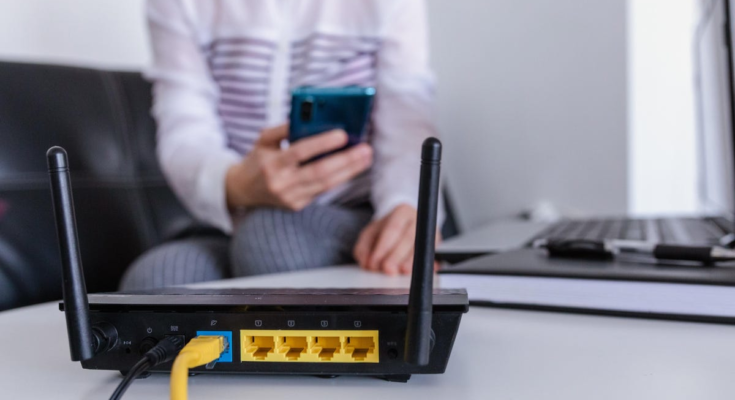
Your home wifi is your lifeline to the internet, which, by extension, is your connection to the world. With internet companies charging what they do these days, you expect your speeds to be fast and constant, in order to watch 4K streaming or play games online with friends. However, there are plenty of obstructions around your home that can stop your wifi from performing at its peak.
How wifi interacts with your space
In order to understand how certain objects and materials block and weaken wifi, it’s important to know what wifi really is. In short, wifi isn’t the internet itself: Rather, it’s radio waves that allow your devices to communicate with your router, which in turn connects to the internet.
Radio waves, like wifi, can pass through physical objects. If not, wifi wouldn’t be an effective or efficient way to connect to the internet. If wifi was exactly like light, it’d be bright and illuminating until it hit a solid surface—anything behind the surface wouldn’t see any light, while we know you can still connect to wifi from another room in your house.
While wifi can pass through physical objects and still reach your devices, it won’t arrive at full strength. When wifi hits an interference, it diminishes. Depending on the object it hits, the effects can be minimal or impactful. That’s the difference between reaching advertised internet speeds, and experiencing painfully slow, low-quality signals.
Your house might be in the way
If your wifi speeds suck, your house itself might be to blame. If your wifi signal is trying to reach you through concrete walls and floors, steels studs, or other types of heavy objects, it’s going to have a hard time living up to its full potential. Wifi and metal especially don’t mix well, so any type of metal in your walls and floors could block or degrade the signal from reaching you.
Wood and drywall, on the other hand, aren’t particularly effective against wifi, making them ideal for spreading a wifi signal across a house. If you’re getting excellent wifi speeds even when your router is hidden in another room, or behind closet, it’s likely having a fine time passing through those types of materials.
Of course, no one builds a house to maximize internet speeds. You need to live with the cards you’re dealt in this situation: If your walls are full of metal, or your house is constructed using concrete or cinderblock, there’s not much you can do to fix that. That’s why router placement is so important: the fewer obstructions there are between your devices and your router, the better.
Appliances are often not friendly to wifi
While most electronics are fine to use with wifi—after all, anything connecting to wifi is, by definition, an electronic—some are simply wifi killers. Consider the kitchen, which not only is a space many use the internet in, but is often close by or directly connected to other internet-heavy rooms. The appliances in the kitchen, such as your dishwasher, refrigerator, and oven, are large, metal boxes, doing your wifi signal no favors. That’s not to mention the microwave, which, aside from being a solid metal box as well, also emits interfering waves of its own.
Other appliances can be impactful, too: washing machines and driers, which can be located in various parts of your home (sometimes even the kitchen!) are offenders. If your signal is traveling through these rooms to get to you, it might be having a rough time.
Think of the thin metal obstacles in your home
Two big offenders you might not be thinking about? TVs and mirrors. Your flat-screen TV is really a thin metal sheet, ready to block your wifi signal from the objects around it. If you use a game console or a smart device to connect to the internet from your TV, you can see how that could be problematic.
Mirrors, too, aren’t good news. They are also metallic, and can degrade your signal. I happen to have a mirror directly next to my TV, a placement I might soon reconsider…
Old tech might be getting in the way
This one’s a long-shot, but hey, it could apply to you. While modern tech is designed not to mess up your wifi signals, old tech wasn’t so forward thinking. In particular, Bluetooth devices of the past can interfere with your wifi, and put a strain on the stability of your signal. If you have old Bluetooth devices laying around your living room, consider moving them away from anything you’re trying to use the internet with.
What you can do to avoid blocking your home wifi
Now that you’re aware of the objects in your home that might be blocking or otherwise compromising your wifi signals, you’re likely wondering how you can improve things. We’ve discussed ways you can boost your router’s speed and performance, since there are plenty of steps and tricks to help make your wifi better.
However, there is one tip above all I hope you take away from this article: Place your router somewhere open. While not everything in your home will sharply degrade your wifi signals, the best thing to do is to limit any and all obstacles from the router to your devices. Placing your router in as open an area as possible is the best step to take here.
Not all setups are the same: While some of us have the flexibility to place a router on a table in our living rooms, others are tied to wherever their internet access point lives. Mine, for example, is fixed in my bedroom closet, so there’s not a whole lot I can do, save for running an ethernet extension throughout my home (hey, now there’s a fun weekend project idea).
My previous place, however, had the access point in the living room, which gave me the flexibility to place the router in a more open position. Connecting to the internet from the living room or even the kitchen was a breeze, because nothing was in the way. If you have the ability, live by this philosophy when working with your own internet setups.



